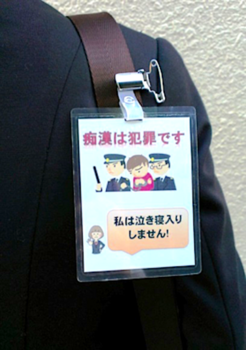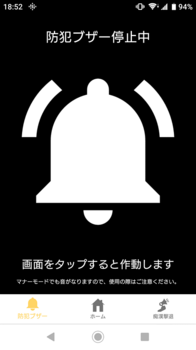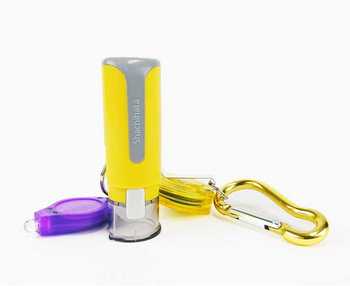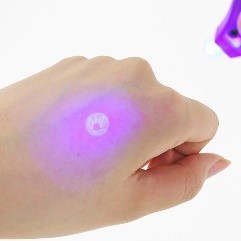痴漢撃退グッズ [英語]
通勤客は痴漢防止にさまざまな対策を講じる。
アプリ、バッジ、目に見えないインクなどで痴漢に反撃を開始。
満員電車に付き物の痴漢に悩まされている日本の女性たちが、様々な痴漢撃退グッズを駆使して痴漢被害から身を守っている現状についてイギリスの経済誌エコノミストが伝えていま。
「日本語訳」
痴漢注意報
日本の通勤客は痴漢防止にさまざまな対策を講じている
痴漢の被害者たちはアプリ、バッジ、目に見えないインクなどで痴漢に反撃を開始

松永弥生さんは20代のころずっと、毎日のように仕事の行き帰りに満員電車内で痴漢にあっていた。
あれから30年後、友人の娘さんが高校に通う電車内で痴漢にあっていることを知った。その女子高生は痴漢被害の事を警察や鉄道会社と話しても徒労に終わってしまったので、彼女はあることを取ることにした。「痴漢は犯罪です。私は泣き寝入りしません。!」という痴漢防止カードをカバンにつけることにした。そうしたところ、あっという間にに痴漢に遭うことはなくなった。この女子高生の行動に刺激されて、松永さんは2015年にクラウドファンディング・キャンペーンを立ち上げて、痴漢防止バッジを作成することにした。このバッジは女子高生がカバンに付けているカードと同じくらいの効果が出て、このバッジを付けた人の95%近くの人が公共の交通機関などで痴漢に遭うことがなくなったことがある調査でわかった。
女性専用車両の運行や、天井にカメラを取り付けて痴漢の現場を撮影するなどのほかに、最近相次いで痴漢撃退グッズが出回るようになってきた。。キュカを立ち上げたNari Woo 氏とRemon Katamaya氏は痴漢レーダーを開発したが、このアプリはユーザーが痴漢の被害を匿名で報告出来て、どこでよく見られるかがわかるようになっている。今年の8月に発売して以来、国内の痴漢被害件数は981件が報告されている。東京の警視庁も防犯アプリ、Digi Policeを開発した。画面をタッチするとアプリが起動して、「止めてください。」と大声を上げる。そして画面に「痴漢です。助けてください。」と表示される。個人向けの印鑑を販売しているシヤチハタは痴漢の被害者が目に見えないインクで加害者にマークを付けることが出来、特殊ライドを当てるとマークが浮かび上がるスタンプを開発した。1個2,500円で500個限定のテスト販売を始めたところ、30分程度で完売した。
2017年、痴漢の被害は2943件に上ったが、大半は東京で起きている。実際の被害者数は間違いなくもっと多いはずである。女性通勤者の半数以上が痴漢の被害にあっているとの調査結果もあるが、被害を警察に届け出る人は10%にとどまっている。恐怖心や恥ずかしさで届け出ない人もいれば、学校や職場に送れるのがいやで届け出ない人もいる。「私たちは痴漢は大して騒ぐほどのことではないという考えに慣らされている。」とWooさんは話している。
痴漢はこれまで性的暴行ではなくて、ささいなことと見られてきたと話すのは龍谷大学の牧野雅子氏。痴漢の加害者は6か月の実刑、または50万円の罰金が課せられる。暴行行為が加われば、最長10年の実刑となる
メディアが痴漢のぬれぎぬを着せられた男性たちの話題を取り上げる傾向が出てきても、あまり痴漢被害の解決にはならない。女子生徒に痴漢行為をしたとして不当に非難された男性の話を取り上げた本や映画が2007年にヒットした。痴漢の冤罪と戦う通勤客ためにその費用を負担するサービスを始めた保険会社も現れてきた。現在、痴漢防止活動センターという組織を運営している松永さんは「痴漢の被害を撲滅することは出来ると信じています。」と、前途に期待を抱いている。
記事で取り上げられた様々な痴漢撃退グッズ、アプリ

女子高生のカバンに取り付けた痴漢防止カード

痴漢防止バッジ

警視庁が開発した防犯アプリ、Digi Police

警視庁が開発した防犯アプリ、Digi Police

シヤチハタの「迷惑行為防止スタンプ」

ブラックライトを当てると手のひらのマークの印影が浮かび上がる
「英文記事」
Pervert alert
Japanese commuters try new ways to deter gropers
Victims are fighting back with apps, badges and invisible ink
The Economist 2019/10/31
THROUGHOUT HER 20s, Yayoi Matsunaga was groped, almost daily, on packed rush-hour trains going to and from work. Three decades later, she discovered that her friend’s daughter was being molested on her commute to high school. The teenager, after fruitless talks with the police and railway companies, decided to hang a sign from her bag that read: “Groping is a crime. I will not cry myself to sleep.” The groping stopped immediately. Inspired, Ms Matsunaga launched a crowdfunding campaign in 2015 to create badges with the same message. They proved as effective as the sign: nearly 95% of users stopped experiencing groping on public transport, according to a survey.
Recent years have seen a flurry of innovations in the fight against groping—chikan in Japanese—in addition to the many train services that offer carriages which only women can use, or have installed ceiling cameras in the hope of catching molesters on film. Nari Woo and Remon Katayama of QCCCA, a startup, have launched “Chikan Radar”, an app that enables users to report groping and thus see where it is common. Since its launch in August, 981 cases have been reported across Japan. The Tokyo Metropolitan Police have also created an app, “Digi Police”, that, when activated, screams “Stop it!” and produces a full-screen message that says: “There is a molester. Please help.” Shachihata, a company that sells personal seals, has developed a stamp that allows victims to mark their attackers with invisible ink, which can be detected under ultraviolet light. A trial run of 500 anti-groping stamps, priced at ¥2,500 ($23), sold out within 30 minutes.
There were 2,943 reported cases of groping in Japan in 2017, mostly in Tokyo. The true number of victims is undoubtedly far higher. Surveys suggest that half or more of female commuters have experienced it, although only 10% of victims report the crime to police. Some hold back out of fear and embarrassment; others because they do not want to be late for school or work. “We are socialised to think that groping is not a big deal,” says Ms Woo.
Groping has long been trivialised as a nuisance rather than a form of sexual assault, says Masako Makino of Ryukoku University. Offenders face up to six months in prison or fines of up to ¥500,000. (The potential sentence rises to ten years if violence is involved.)
It does not help that the media tend to focus on stories about men who have been falsely accused of groping. A book and film about a man unjustly accused of molesting a schoolgirl became a hit in 2007. Insurance firms provide policies that defray the cost to commuters of fighting accusations of groping. But Ms Matsunaga, who now runs an organisation called the Groping Prevention Activities Centre, remains hopeful: “I believe that we will be able to eliminate groping.”
アプリ、バッジ、目に見えないインクなどで痴漢に反撃を開始。
満員電車に付き物の痴漢に悩まされている日本の女性たちが、様々な痴漢撃退グッズを駆使して痴漢被害から身を守っている現状についてイギリスの経済誌エコノミストが伝えていま。
「日本語訳」
痴漢注意報
日本の通勤客は痴漢防止にさまざまな対策を講じている
痴漢の被害者たちはアプリ、バッジ、目に見えないインクなどで痴漢に反撃を開始

松永弥生さんは20代のころずっと、毎日のように仕事の行き帰りに満員電車内で痴漢にあっていた。
あれから30年後、友人の娘さんが高校に通う電車内で痴漢にあっていることを知った。その女子高生は痴漢被害の事を警察や鉄道会社と話しても徒労に終わってしまったので、彼女はあることを取ることにした。「痴漢は犯罪です。私は泣き寝入りしません。!」という痴漢防止カードをカバンにつけることにした。そうしたところ、あっという間にに痴漢に遭うことはなくなった。この女子高生の行動に刺激されて、松永さんは2015年にクラウドファンディング・キャンペーンを立ち上げて、痴漢防止バッジを作成することにした。このバッジは女子高生がカバンに付けているカードと同じくらいの効果が出て、このバッジを付けた人の95%近くの人が公共の交通機関などで痴漢に遭うことがなくなったことがある調査でわかった。
女性専用車両の運行や、天井にカメラを取り付けて痴漢の現場を撮影するなどのほかに、最近相次いで痴漢撃退グッズが出回るようになってきた。。キュカを立ち上げたNari Woo 氏とRemon Katamaya氏は痴漢レーダーを開発したが、このアプリはユーザーが痴漢の被害を匿名で報告出来て、どこでよく見られるかがわかるようになっている。今年の8月に発売して以来、国内の痴漢被害件数は981件が報告されている。東京の警視庁も防犯アプリ、Digi Policeを開発した。画面をタッチするとアプリが起動して、「止めてください。」と大声を上げる。そして画面に「痴漢です。助けてください。」と表示される。個人向けの印鑑を販売しているシヤチハタは痴漢の被害者が目に見えないインクで加害者にマークを付けることが出来、特殊ライドを当てるとマークが浮かび上がるスタンプを開発した。1個2,500円で500個限定のテスト販売を始めたところ、30分程度で完売した。
2017年、痴漢の被害は2943件に上ったが、大半は東京で起きている。実際の被害者数は間違いなくもっと多いはずである。女性通勤者の半数以上が痴漢の被害にあっているとの調査結果もあるが、被害を警察に届け出る人は10%にとどまっている。恐怖心や恥ずかしさで届け出ない人もいれば、学校や職場に送れるのがいやで届け出ない人もいる。「私たちは痴漢は大して騒ぐほどのことではないという考えに慣らされている。」とWooさんは話している。
痴漢はこれまで性的暴行ではなくて、ささいなことと見られてきたと話すのは龍谷大学の牧野雅子氏。痴漢の加害者は6か月の実刑、または50万円の罰金が課せられる。暴行行為が加われば、最長10年の実刑となる
メディアが痴漢のぬれぎぬを着せられた男性たちの話題を取り上げる傾向が出てきても、あまり痴漢被害の解決にはならない。女子生徒に痴漢行為をしたとして不当に非難された男性の話を取り上げた本や映画が2007年にヒットした。痴漢の冤罪と戦う通勤客ためにその費用を負担するサービスを始めた保険会社も現れてきた。現在、痴漢防止活動センターという組織を運営している松永さんは「痴漢の被害を撲滅することは出来ると信じています。」と、前途に期待を抱いている。
記事で取り上げられた様々な痴漢撃退グッズ、アプリ

女子高生のカバンに取り付けた痴漢防止カード

痴漢防止バッジ

警視庁が開発した防犯アプリ、Digi Police

警視庁が開発した防犯アプリ、Digi Police

シヤチハタの「迷惑行為防止スタンプ」

ブラックライトを当てると手のひらのマークの印影が浮かび上がる
「英文記事」
Pervert alert
Japanese commuters try new ways to deter gropers
Victims are fighting back with apps, badges and invisible ink
The Economist 2019/10/31
THROUGHOUT HER 20s, Yayoi Matsunaga was groped, almost daily, on packed rush-hour trains going to and from work. Three decades later, she discovered that her friend’s daughter was being molested on her commute to high school. The teenager, after fruitless talks with the police and railway companies, decided to hang a sign from her bag that read: “Groping is a crime. I will not cry myself to sleep.” The groping stopped immediately. Inspired, Ms Matsunaga launched a crowdfunding campaign in 2015 to create badges with the same message. They proved as effective as the sign: nearly 95% of users stopped experiencing groping on public transport, according to a survey.
Recent years have seen a flurry of innovations in the fight against groping—chikan in Japanese—in addition to the many train services that offer carriages which only women can use, or have installed ceiling cameras in the hope of catching molesters on film. Nari Woo and Remon Katayama of QCCCA, a startup, have launched “Chikan Radar”, an app that enables users to report groping and thus see where it is common. Since its launch in August, 981 cases have been reported across Japan. The Tokyo Metropolitan Police have also created an app, “Digi Police”, that, when activated, screams “Stop it!” and produces a full-screen message that says: “There is a molester. Please help.” Shachihata, a company that sells personal seals, has developed a stamp that allows victims to mark their attackers with invisible ink, which can be detected under ultraviolet light. A trial run of 500 anti-groping stamps, priced at ¥2,500 ($23), sold out within 30 minutes.
There were 2,943 reported cases of groping in Japan in 2017, mostly in Tokyo. The true number of victims is undoubtedly far higher. Surveys suggest that half or more of female commuters have experienced it, although only 10% of victims report the crime to police. Some hold back out of fear and embarrassment; others because they do not want to be late for school or work. “We are socialised to think that groping is not a big deal,” says Ms Woo.
Groping has long been trivialised as a nuisance rather than a form of sexual assault, says Masako Makino of Ryukoku University. Offenders face up to six months in prison or fines of up to ¥500,000. (The potential sentence rises to ten years if violence is involved.)
It does not help that the media tend to focus on stories about men who have been falsely accused of groping. A book and film about a man unjustly accused of molesting a schoolgirl became a hit in 2007. Insurance firms provide policies that defray the cost to commuters of fighting accusations of groping. But Ms Matsunaga, who now runs an organisation called the Groping Prevention Activities Centre, remains hopeful: “I believe that we will be able to eliminate groping.”




コメント 0